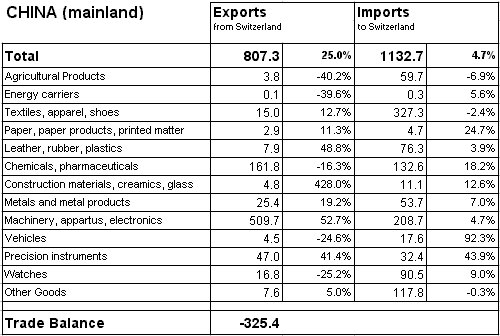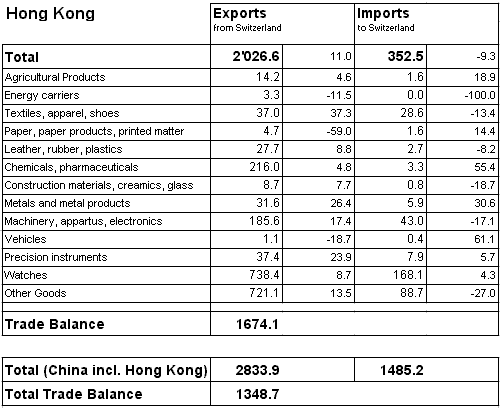|
Swiss exports to China up 25% in 1st half of 2001
Swiss exports to mainland China grew by 25% (to CHF 807 million) in the first half of this year, while imports from China increased just 4.7% (to CHF 1'133 million). The Swiss trade deficit with China for the period of January to June thus amounts to CHF 354 million. Machinery (in particular industrial and electrical) enjoyed a very healthy growth at 52.7% and was once again the by far largest category of export goods (63.1% of total exports). On the other hand, exports of chemicals and pharmaceuticals, the second largest export category (20.0% of total exports) declined by 16.3%. Swiss exports to
Hong Kong increased 11% (to CHF 2'027 million) in the same period, while imports from Hong Kong decreased -9.3% (to CHF 352.5 million). Swiss exports to Taiwan slowed by -7.1% (to CHF 712.6 million), while imports from
Taiwan decreased -11.6% (to CHF 472.1 million). (Embassy of Switzerland, 4 August) See more details
below.
Insurance companies run for leading listing
Shanghai-based Dazhong Insurance Co Ltd. expects to become the first ever listed insurer in China. Financial analysts were reported to have high opinions about the insurance shares coming soon in China, saying that investors are likely to go for insurance companies, which are the next big thing after telecommunications. (China Daily, 30 July)
China's central bank will not set up supervisory bureau
People's Bank of China has denied a report that it is preparing to set up a supervisory bureau to crackdown on financial crimes. The denial came after a newspaper in South China reported that PBOC would invite some economic anti-crime experts from the Ministry of Public Security to head the new bureau, which will focus on financial crimes. (China Daily, 30 July)
Policies to revive trade growth
China is to bring out new policies and improve government efficiency in order to counter slack export growth. The Ministry of Foreign Trade and Economic Co-operation, the People's Bank of China, and the State Taxation Administration are soon to publish detailed rules on mortgage loans for export tax rebates. Some provinces and municipalities started this year to loan to exporters with the tax rebates as collateral. The Central government plans to spread the measure throughout the country. (China Daily, 30 July)
Olympic bubble?
Some analysts on the mainland have warned of a possible bubble economy in the wake of the optimistic picture painted by mainland officials and the media of the effects of Beijing's winning Olympics bid. Mainland media provided a flurry of conflicting predictions about how the Olympics engine would drive the Chinese economy. (International Finance News, 30 July)
Beijing registers rapid industrial growth
Beijing's industrial added value hit RMB 39.8 billion yuan in the first half of this year, up 19.7% from the same period of last year. The high-tech sector had turned into an impetus for the economic growth and achieved an added value of about RMB 1.247 billion, up 35.6%. (Xinhua, 31 July)
Aid deal signals easing of post-Tiananmen sanctions
The US Trade and Development Agency resumed a grant assistance programme to China, ending a sanction imposed on Beijing after the 1989 Tiananmen Square massacre. The agency mainly provides funds for technical aid and training to encourage purchases of US goods and services. The agency will focus initially on the environmental sector but would also consider industrial and infrastructure projects, including transport, aviation and energy. The agency generated USD 467 million in US exports to China before 1989. (Reuters, 1 August)
Subway construction in Beijing gets Canadian fund
A Sino-Canadian joint venture will be founded for the construction of the No. 5 subway in Beijing. Of the total investment of RMB 100 million for the project, 62.5% will come from the Beijing No. 5 Subway Investment Corp. of China, and the rest from SNC-Lavalin of Canada. (Xinhua, 1 August)
Foreign investment contributes 2.7% to GDP growth
From 1980 to 1999 a yearly average of about 2.7% out of China's 9.7% GDP growth had come from direct or indirect foreign investment. By the end of May 2001, investors from over 180 countries and regions have set up more than 370'000 enterprises in China, with a total contract value over USD 700 billion and USD 363.6 billion actually used. By the end of last year some 20 million people had been employed in foreign-funded enterprises, or about 10% of urban labors across the country. (Xinhua, 1 August)
Retail gold price curbs relaxed
Gold retailers have been given free rein to set prices, in the hopes of boosting dull consumption of the metal in the rigidly controlled domestic market. Before the price deregulation, the central People's Bank of China set a weekly standard and gold stores could tag their prices within a prescribed limit. (Reuters, 2 August)
TV manufacturing industry in risk of collapse
The fierce competition on the domestic television manufacturing market is getting out of hand. The Ministry of Information Industry has warned that if the sector fails to take improving measures and the current, severe price war continues, the industry will collapse. Poor research and development, and the failure to develop new products have filled the market with an overload of outdated products.
(www.cbiz.cn, 2 August)
10 software centres planned
China plans to build 10 national software development centres in Beijing, Shanghai, Dalian, Chengdu, Xi'an, Jinan, Hangzhou, Guangzhou, Changsha and Nanjing. The new centres aim to readjust resources of software enterprises and form unified software industries in hope of enhancing market competitiveness. The establishment of software centres is an important step to carry out a series of policies encouraging the development of software and integrate circuit industries promulgated by the State Council last year. (Xinhua, 2 August)
China's stockmarket
reforms: Second board, second thoughts
Despite long preparations to establish a second-board stockmarket, where listing requirements are looser, to help start-up technology firms raise funding, the launch, originally expected late last year, has once again been delayed. The Economist takes a look at arguments for and against a second board considered among China's leadership. (Economist, 2 August)
Law ensures fair play for joint ventures
The State Council issued a decree amending the implementation and regulation of the Chinese and Foreign Equity Joint Ventures Law to improve the environment for foreign investment. According to the amendment, Sino-foreign joint ventures are free to buy equipment, raw material, fuel, accessories, conveyance and stationery in China or from abroad. In the past these firms were required to buy Chinese. Restrictions governing joint ventures' sales on the domestic market have also been repealed. (China Daily, 3 August)
Proactive fiscal policy needs adjustment
A lengthy article published simultaneously by China Daily and People's Daily discusses the merits of China's proactive fiscal policy and asks, whether it has run its course. Fixed investment financed by national debt as well as supplementary funds raised by local governments now account for as much as one third of total fixed investment in some provinces, while the growth rate of private investment remains slow. The article admits that the liabilities owed by local governments would make the real level of China's debt much higher than the published debt to GDP ratio of 14.6 %. The article points out the risks of letting the heavier-debt approach drag into a long-haul policy, but on the other hand cautions that stopping it abruptly may result in an economic backslide. (China Daily, 3 August)
Beijing removes downtown factories to improve air quality
Beijing has gone to work on its Olympic Games promise to improve air quality by moving the first industrial enterprise, Machine Tool Factory No.1, out of the downtown area. 133 other polluters will move out of the area inside the city's new Fourth Ring Road over three years. (China Central TV, 3 August)
Unemployment in Beijing on the rise
Beijing reported its highest unemployment figures since 1984 in the first half of this year. Joblessness has risen 0.3% year-on-year to 0.92%. The number of registered unemployed workers was up 53%, with enterprises increasing reforms and more people coming to look for work in the capital. Beijing has 440'000 unemployed people. (China News Service, 3 August)
China to issue RMB 20 billion in treasury bonds
China is to issue RMB 20 billion worth of treasury bonds from August 6 to August 9. This will be the eighth batch of registered treasury bonds issued by China this year. The T-bonds have a maturity period of two years and an annual interest rate of 2.46%, with interest paid annually. (Xinhua, 3 August)
Ban lifted on non-publicly owned sector entering foreign trade field
The the previous review-and-approval system for import and export rights has been abolished, except for enterprises with foreign investment. A registration-and-verification system will be adopted instead. Restrictions on the non-publicly owned sector of the economy entering the foreign trade field will this be completely eliminated. (ChinaOnline, 3 August)
Mainland firms' RMB 400 billion spree on stock markets
Mainland corporations illegally spent RMB 400 billion in bank loans speculating on China's stock markets last year. The estimate follows reports this week that Beijing had ordered commercial banks to crack down on firms taking out loans intended for corporate use but which are spent on stock markets. (SCMP, 4 August)
|
Weekly Market update
|
03 August 2001
|
27 July 2001
|
|
Shanghai A
|

|
2048.77
|
2156.71
|
|
Shanghai B
|

|
159.58
|
182.95
|
|
Shenzhen A
|

|
611.93
|
645.42
|
|
Shenzhen B
|

|
269.91
|
291.40
|
|
Hong Kong Red Chip
|

|
1067.32
|
1083.94
|
|
Hong Kong H
|

|
451.58
|
474.72
|
|
Source: South China Morning Post
|
Bilateral Trade between Switzerland and China
January - June 2001
in Mio. CHF


Source: Swissmem
|